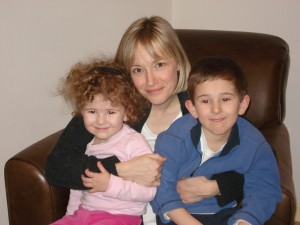By Naomi Aldort, author of Raising Our Children, Raising Ourselves, www.AuthenticParent.com.

When my children were young, it was common for me to take them when I traveled for speaking engagements. At their stages of development, they still wanted and needed to stay close to me.
I recall a psychologist friend of mine doubting my decision to take my then two-year-old with me. “If he cries it will help him to recover from past experiences of separation,” she said. She felt that the best way to get over separation anxiety is to encourage separations.
However, my child had no past experiences of separation to overcome, and I wanted to keep him free of such experience as long as he needed my uninterrupted closeness.
By nature there is no such a thing as “separation anxiety.” Instead, there is a healthy need of a child to be with her mother. Only a deprivation of a need creates anxiety. If we honor the need for uninterrupted physical closeness as long the child needs it, no anxiety develops. The concept “separation anxiety” is the invention of a society that denies a baby’s and child’s need for uninterrupted connection. In this vein, we can deprive a child of food and describe her reaction as “hunger anxiety,” or we can let her be cold and call her cries “temperature anxiety.”
My son, Lennon Aldort, says it well: “Our modern society and the nuclear family are large-scale experiments in extreme deprivation of the needs of both children and parents.” Parents are doing their best to move away from denying children their needs. Yet sometimes even the most securely attached parents, under pressure from extended family and friends, expect a child to live up to external expectations.
Some parents feel pressure to compare their children to others: “How come the other child is willing to be without his mother?” I always reassure parents by pointing out that the other child is a different person, and it is possible that the other child has, unfortunately, given up on what is best for himself. If your child is insisting on what is best for her, it is a reason to rejoice and to know that your parenting approach is empowering her self-confidence.
Stages of development
The confusion starts when we see a child as seemingly regressing. She was happy to stay without you at age two, and is suddenly back to needing you all the time at age three. But should we call this a “separation anxiety?” Or is it our own “intolerance for changing back and forth anxiety?”
Children try new things for a while only to recapture their old “baby” ways with gusto a year later. These changes are part of their steps forward. There is no rule that says that once a child achieves something, she must stick to it. In fact, observation tells us that most children go through such changes. They sometimes return to a former familiar stage to establish more confidence and gain a new momentum. Normal development in the early years may be two steps forward and one step back, a balance between exploring autonomy and feeling the need for security. They must feel secure and know that the door behind them never shuts, or they will not dare to try new territory.
Another reason children try things and then retreat is precisely because they become more aware. The world appears quite simple and safe to a toddler: Mommy, Daddy, couch, kitchen, doggy, yard, street, et cetera. As the child’s awareness grows, everything becomes larger and scarier. There is so much more unknown and so much that can happen. The child must be sure that springing out of the familiar doesn’t burn the bridge behind her. Being sure of that, she can try more new experiences with confidence.
Loving solutions
Sonya asked for my advice about her five-year-old child’s “separation anxiety.” “Haya wants to be with me at all times,” she said. “She even joins me in the bathroom.” Such a need can be natural even in a child who was never pushed too soon to be away from mom. But in Haya’s case, there was an early attempt to leave her at a nice, small preschool for half days. She seemed to enjoy the school but was having a hard time departing from her mother in the morning. “She was fearful and clingy, and over time she started to be more whiny at home and less happy,” her mother said.
I suggested stopping taking Haya to preschool. The result was immediate and dramatic:
“I got my child back,” Sonya said. “She is happy again and self-engaged, but she is still unable to be away from me.” Haya will regain her trust and confidence. She needs time in which there is no reminder of her experience of separation. She must know that it is up to her to be without mom. When we respond to the child, rather than try to manipulate her development, she can stay content. Keep a benign attitude of trust and peace with no hints of future expectations. On the other side, stay away from drama about her need for you. With no agenda, the child will act from within.
What if parents work away from home?
In many families, one or both parents work outside the home. Regardless of what options you may have, if you leave the baby or young child before she is ready, she is likely to develop anxiety about losing you. There are ways to alleviate the hurt and reduce the anxiety. If possible, the baby or child could stay in a familiar and loved space, such as at home or in another familiar home, with one or two intimately familiar people who love her, like Daddy, a grandparent or another consistent and loving caregiver.
Breastfeeding is nature’s magical way of telling you to stay close to your baby and toddler. When you go to work without your baby, do express milk for her but also minimize the time you are away. If after you return home your baby cries a lot, or your child is cranky and clingy, give her your full attention, validate her feelings and let the tears flow so she can heal.
Always validate and give outlet to self-expression. “You want mommy to stay with you. I know. I miss you too. I love you so much. Tell me about your day.” Make peace with your child’s anxiety about your absence, so you are not anxious yourself. Your child needs a secure parent who can listen to her.
Denial teaches denial
Some parents believe that by denying the child’s need repeatedly and consistently, the child will develop the “muscle” and learn to be comfortable away from mom. Unfortunately, the child does learn to be away from mom, but in doing so, she must detach emotionally and ignore her own inner voice. The process is not one of developing inner strength, but of resignation and of losing trust.
What we see externally is not always what the child experiences inside. As one three-year-old said to her mother: “At daycare I look smiling outside, but I am crying inside.” The innate drive of the child to please us and seek our approval causes her to comply rather than choose authentically. She learns to deny her own inner voice and follow external expectations instead because she yearns to fit in with our world. In order to do this, she must shut down her feelings and her sense of connection. Training your child to give up on herself and follow others leads to insecure teenagers and adults who, thoughtlessly, follow peer pressure, media and other external influences.
Each family must make the child care choices that they feel are best, and we must learn to love the life we have so the child will develop emotional resilience. But do allow for crying, validate the feeling and know that she may develop a separation anxiety that you will want to keep healing.
Rejoice in your child’s connection
When children rage and refuse to separate, I always celebrate. “Your child is not a tameable one,” I say. “You must have done a wonderful job of protecting her authentic being.” The more the child is rooted in herself, the less you can sway her away from who she is. We call it confidence.
When your child tells you confidently in words or actions, “I want to stay with you all the time,” and you respond to her need, she learns, “I can trust myself. My mom trusts me and takes my cues seriously.” The child who relies on herself and does not deny herself in an attempt to please you is developing self-reliance and confidence. She stays connected not only to you but to herself, creating bridges of love and inner independence.

 Depression — a mental illness marked by unrelenting sadness and hopelessness that permeates the lives of an estimated one in 18 people — is among the most prevalent medical disorders in today’s world, affecting 12 percent of women, 7 percent of men, and 4 percent of adolescents in a given year. Eight percent of adults will develop depression sometime in their life, and women are most prone — their lifetime risk is 20 percent.
Depression — a mental illness marked by unrelenting sadness and hopelessness that permeates the lives of an estimated one in 18 people — is among the most prevalent medical disorders in today’s world, affecting 12 percent of women, 7 percent of men, and 4 percent of adolescents in a given year. Eight percent of adults will develop depression sometime in their life, and women are most prone — their lifetime risk is 20 percent.